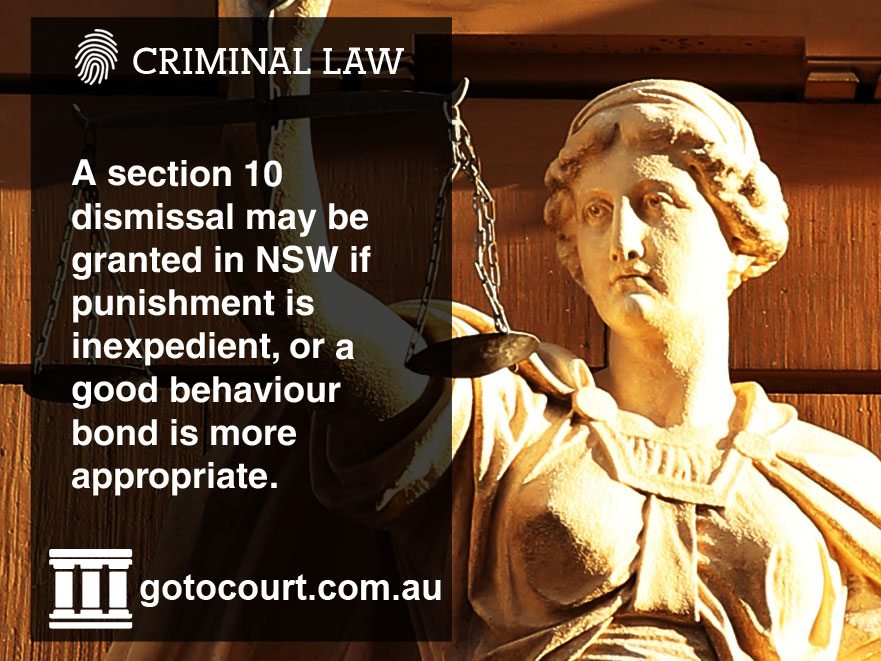Dismissal of Charges in New South Wales
In New South Wales, when a Court determines that a person is guilty of an offence, one of the sentencing options available to the presiding Judge or Magistrate is to have the charges dismissed altogether, or dismissed subject to conditions. There are three such options regarding dismissal of charges under section 10 of the Crimes (Sentencing Procedure) Act 1999.
When section 10 Dismissal of Charges may be ordered
If a Court is satisfied that it would not be expedient to punish a person, or if it is satisfied that it would be more expedient to require a defendant to enter into a good behaviour bond, then it may make a section 10 order. In considering whether or not it is expedient to dismiss charges, the Court is required to have regard to a number of factors, including whether or not the offence is of a trivial or minor nature, the offender’s physical and mental health, age, family and social or cultural background, and other matters the Court considers relevant. Participation in intervention programs may be ordered where it appears appropriate to the Court that the offender have the opportunity to be rehabilitated for his or her offence.
Dismissal of charges
The first of the sentencing options is available under section 10(1)(a) of the Crimes (Sentencing Procedure) Act 1999, which allows for the dismissal of the charges, without any further conditions.
This option is only available for very minor or trivial summary offences, for example, minor traffic infringements, drug possession (small amounts for personal use) and breaches of the peace such as drunk and disorderly charges.
Discharges conditional on a Good Behaviour Bond
Prior to recording a conviction, a Court may order that the offender be discharged, subject to him or her entering into a good behaviour bond of up to 2 years’ duration (section 10(1)(b) of the Act). A good behaviour bond is an undertaking to be of good behaviour, and requires the offender to appear before a Court periodically throughout the term of the bond. A good behaviour bond may also include a requirement that the offender participate in an intervention program. If the Court suspects that an offender has breached a good behaviour bond, it may call the offender to Court – issuing a warrant for arrest if necessary – to answer to the allegations. Thereafter, the Court may elect to do nothing, revoke the bond or vary the conditions of the bond.
The laws regarding good behaviour bonds are contained in Part 8 of the Crimes (Sentencing Procedure) Act 1999.
Discharges conditional on participation in an Intervention Program
The third sentencing option available under section 10 is the discharge of the offender, on the condition that he or she participate in an intervention program and afterward comply with the conditions of the intervention plan (section 10(1)(c) of the Act). An intervention program is a program designed to help with the rehabilitation of the offender, including increasing his or her awareness of the implications of the offence on the community and promoting responsibility and accountability of the offender.
Part 6 of the Criminal Procedure Regulation 2010 sets out those programs which are deemed to be intervention programs for the purposes of the Act. These programs include the Circle Sentencing Intervention Program, which is available to certain indigenous offenders, and is designed to increase participation of the Aboriginal community in sentencing. The Forum Sentencing Intervention Program is for domestic or family violence offenders, and the Traffic Offender Intervention Program is designed to educate people who have been charged with traffic offences under the Road Transport Act 2013.
The laws regarding eligibility to participate in intervention programs, sentencing for intervention programs and the enforcement of orders are located at Part 8C of the Crimes (Sentencing Procedure) Act 1999 and Chapter 7 Part 4 of the Criminal Procedure Act 1986.
Effect of a section 10 dismissal of charges
When an order is made under section 10, no conviction is recorded and the offender does not end up with a criminal record. However, if the dismissal of the charges is subject to either a good behaviour bond or an intervention order and the offender breaches those conditions, the bond or order may be revoked and the offender may be convicted for the offence and re-sentenced. This will then result in the offender having a criminal record.
Appeal rights
A section 10 order does not change an offender’s right to appeal the charges on the basis that he or she was not guilty of the offence; in spite of the fact that no conviction or criminal record has been recorded.









